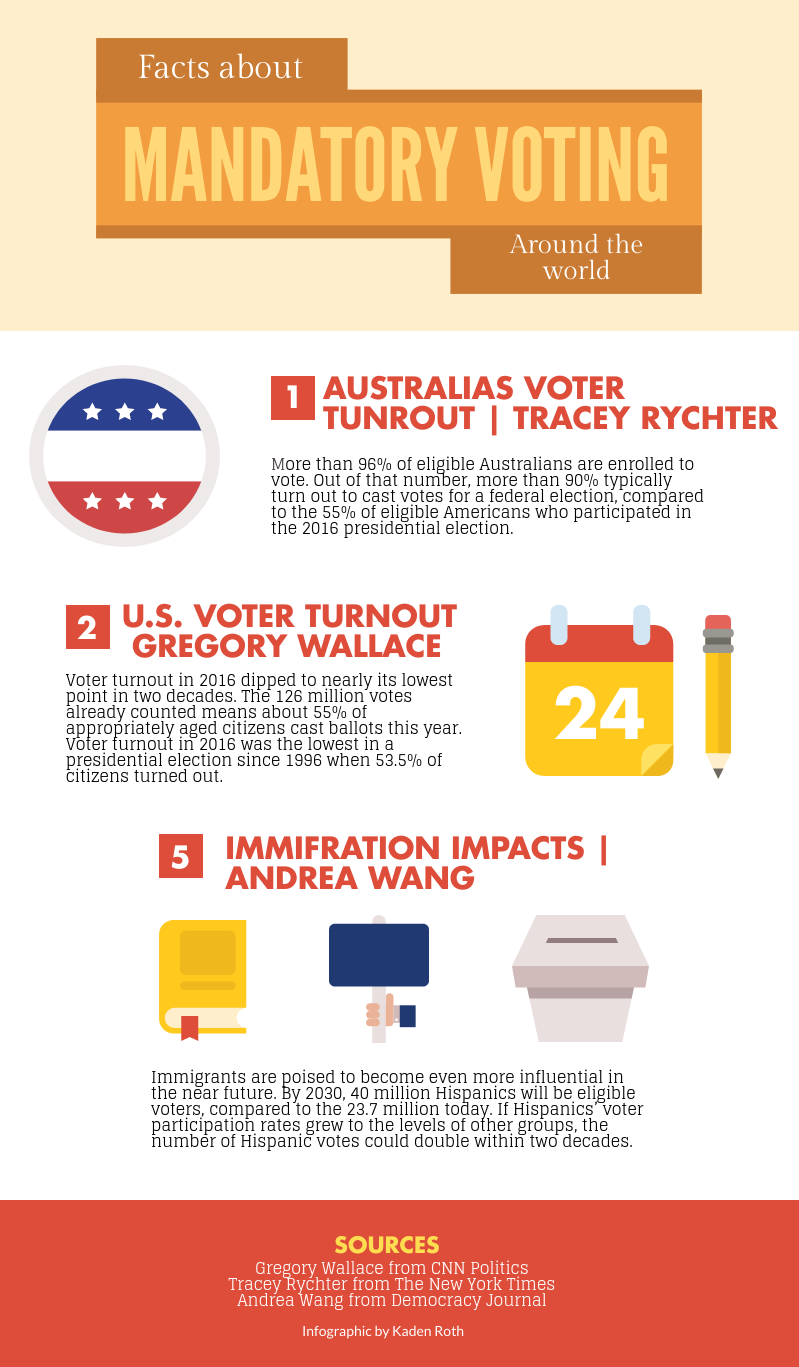Every ballot counts
Voting should be considered to be made mandatory
December 20, 2019

Mandatory or compulsory voting has the ability to have citizens participate in elections. It is important that everyone votes because it ensures that the majority is being represented in the best way possible.
Mandatory or compulsory voting is when a government requires every citizen to turn in a ballot during elections. If citizens choose not to turn in a ballot, they are asked why and if they don’t have a valid reason, they are fined.
Countries that implement mandatory voting believe that it ensures that the government is represented by a majority of the population, not just a few individuals. An example of this would be people who aren’t as politically active because they would be asked to show up and take part in their democracy.
As much as people would like to ignore the fact that money plays a significant role in politics it just can’t be done. But if mandatory voting became law, there wouldn’t be a need for billionaires to fund candidates’ political campaigns. Politicians would need to focus on appealing to the masses instead of certain groups.
Citizens who are obliged to vote every election, most likely want to make the most of their votes. Voters would want to research more on each candidate to ensure they’ll make the right choice. As a result, candidates would be forced to be more transparent about their stance on controversial issues. Better informed voters would be able to determine unrealistic plans, ensuring fairer decisions in the future.
Political scientists worry that older and wealthier Americans vote more often than anyone else. This means that policies are more likely to favor the interests of those voters instead of the other groups. This is called class bias and mandatory voting is a plausible solution.
Belgium is one country out of many that currently implements mandatory voting and it has been in place since 1892. Australia is another country that currently uses mandatory voting, both countries use voting as a way to keep the population involved in politics. Mandatory voting has large political benefits that would help the poor and the working class.
According to Tracey Rychter, a reporter from The New York Times, more than 96% of eligible Australians are enrolled to vote. Out of that number, more than 90% typically turn out to cast votes for a federal election, compared to the 55% of eligible Americans who participated in the 2016 presidential election.
Gregory Wallace from CNN Politics reports that voter turnout in 2016 dipped to nearly its lowest point in two decades. The 126 million votes already counted means about 55% of appropriately aged citizens cast ballots this year. Voter turnout in 2016 was the lowest in a presidential election since 1996 when 53.5% of citizens turned out.
There are plenty of ways to vote if there is no way to make it to a polling place, including postal ballots and overseas embassies. There could be religious exemptions as well as formal abstentions or an option to simply select “none of the above” for voters who do not like any of the candidates. Voters are also allowed to appeal a fine and explain why they failed to participate.
Andrea Wang from Democracy Journal wrote that immigrants are poised to become even more influential in the near future. By 2030, 40 million Hispanics will be eligible voters, compared to the 23.7 million today. If Hispanics’ voter participation rates grew to the levels of other groups, the number of Hispanic votes could double within two decades.
Another way to increase immigrant turnout is to have more immigrant candidates. “Co-ethnic” candidates can have a big impact on immigrant communities by giving them confidence to participate.
Mandatory voting is more than just getting citizens to vote. It encourages immigrants to participate in government and allows everyone the ability to voice their opinions. Voting is an important part of democracy and citizens should view it as a duty to their country.
















